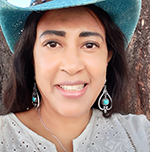By Barrett Holman Leak

SAN DIEGO — The morning’s news awakens me and I listen while getting dressed, until I say “Alexa, STOP and switch to a morning jazz playlist. Sometimes Alexa does not hear me well and I must say STOP more than once and very loudly. Sometimes something must be said very loudly.
Habakkuk 2:20-3:19, opens with a thunderous declaration: “But the Lord is in His holy temple; let all the earth be silent before Him.” This powerful mandate for silence feels particularly resonant in our current American reality. Since the inauguration of our current president, a profound sense of chaos has settled over the nation. Distressed voices dominate our airwaves and digital feeds; the economy feels perpetually on the brink, leading to job losses and financial despair for countless families.
We Americans just spent 130 days having our lives thrown into blistering fiery chaos by a billionaire, Elon Musk, who did not care whom he fired, nor what private information he took, whose life he set on fire. Now he has walked away, leaving America and Americans exploding and burning down, just like a scene out of a movie. Daily, we are met with shocks in nearly every area of life – social, political, economic – leaving us reeling and grasping for stability. In this maelstrom, the most vulnerable among us are often overlooked, while the wealthy seem to accumulate more power and privilege with disturbing ease.
In such a cacophonous and unsettling time, Habakkuk‘s call for silence is not a passive retreat but a radical act of faith in the midst of chaos. It challenges us to consider what truly holds authority in our lives. In our modern world, we often inadvertently create “idols” – not of carved wood or gold, but of ideologies, political figures, material wealth, or even the incessant hum of social media and news cycles. We invest our trust, our emotional energy, and our hope in these constructs, only to find them hollow and incapable of providing the grounding we desperately seek. When the political landscape feels like a shifting desert and the economic ground beneath our feet feels shaky, it becomes painfully clear that our reliance on these temporary gods leaves us utterly vulnerable.
For us as Jews, Habakkuk’s vision invites us to step back from the frantic pace and the overwhelming noise, to silence the internal and external clamor that distracts us. It is in this profound silence that we are meant to encounter the Divine, the ultimate source of order and stability. Shavuot, the celebration of the giving of the Torah at Sinai, is a powerful reminder of a moment when an entire nation stood in awe and reverence before the voice of God. There, in the wilderness, amidst thunder and lightning, the Israelites were called to listen – to set boundaries, to purify themselves, to prepare their hearts to receive a foundational truth that transcended their immediate circumstances.
In our current American disquiet, embracing Habakkuk‘s call to silence means actively disengaging from the toxic cycles of outrage and despair, at least momentarily. As Jews, our thinking must be rooted in the wisdom of Torah and the ethical principles it imparts. We are called to embody Tzelem Elokim (the Divine Image in every person), recognizing the inherent worth and dignity of all, especially the marginalized. This Jewish value compels us to recoil at the sight of the vulnerable being left behind and the valuing of rich over poor.
Our task is not merely to complain, but to act. This means applying the Jewish value of Tikkun Olam (repairing the world). While the world outside may feel chaotic, we ae compelled to not succumb to cynicism or despair. Instead, we are to be partners with God in bringing about a more just and compassionate reality. This isn’t just about large-scale political action, though that is important. It also means committing to acts of G’milut Chasadim (acts of loving-kindness) within our own communities, extending a hand to those who have been fired, offering support to the financially distressed, and ensuring that our synagogues and organizations are true havens for those seeking comfort and guidance.
Furthermore, we are called to embody Kiddush Hashem (sanctification of God’s name) through our actions. How we respond to this chaos, how we treat others, and how we uphold ethical standards in our own lives, reflects upon our faith. When everything seems shaky, our steadfast commitment to Mishpat (justice) and Tzedek (righteousness) becomes even more critical. We must speak out against inequities, advocate for fair policies, and demand accountability from those in power, always guided by the eternal principles received at Sinai.
In the midst of this modern-day upheaval, the prophet Habakkuk reminds us that the Lord is not absent, but rather “in His holy temple.” This suggests a divine presence that is transcendent and eternal, unmoved by the fleeting dramas of human power. Our task, then, is to cultivate an inner “temple” of quiet and reflection, a sanctuary where we can truly hear the divine whisper amidst the roiling currents of distress and fear.
Only by silencing the earthly clamor can we hope to discern the divine voice that calls us back to our covenantal responsibilities: to uphold justice for the vulnerable, to challenge the valuing of rich over poor, of White over Black, of straight over LGBTQ etc. and to build a society rooted in the enduring principles gifted to us at Sinai.
Turn off the news, close down social media, stop all the noise so you can hear the voice of God. May we each strive, this Shavuot, to be silent before God, that we may truly hear what is asked of us in these turbulent times, and then, imbued with Jewish values, act to bring light into the deepening shadows.
*
Barrett Holman Leak is a freelance writer based in San Diego